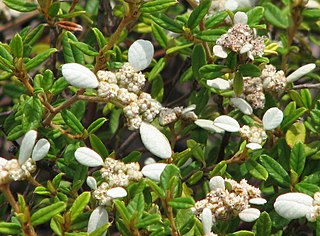
Spyridium is a genus of about thirty species of flowering plants in the family Rhamnaceae, and is endemic to Australia. Plants in the genus Spyridium are shrubs or subshrubs usually with small leaves, flowers usually in clusters of small composite heads, the individual flowers small and densely woolly-hairy, and the fruit a capsule. Species of Spyridium are found in all Australian states except Queensland.
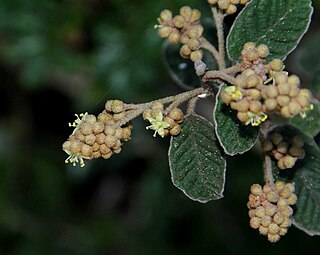
Pomaderris oraria, commonly known as Bassian dogwood, is a species of flowering plant in the family Rhamnaceae and is endemic to south-eastern Australia. It is a compact shrub with hairy branchlets, hairy, elliptic leaves and panicles of hairy, greenish to cream-coloured or crimson-tinged flowers.

Pomaderris paniculosa, commonly known as scurfy pomaderris, is a species of flowering plant in the family Rhamnaceae and is native to Australia and New Zealand. It is a shrub with hairy branchlets, round to elliptic or egg-shaped leaves with the narrower end towards the base and panicles of hairy, cream-coloured to greenish, sometimes crimson-tinged flowers.

Pomaderris helianthemifolia is a species of flowering plant in the family Rhamnaceae and is endemic to south-eastern continental Australia. It is a bushy shrub with hairy young stems, narrowly elliptic to lance-shaped leaves with the narrower end towards the base, and small panicles of hairy yellowish flowers.

Spyridium bifidum, commonly known as forked spyridium, is a species of flowering plant in the family Rhamnaceae and is endemic to South Australia. It is an erect shrub with densely softly-hairy young stems, wedge-shaped to linear leaves sometimes with a two-lobed tip, and densely woolly heads of white-velvety flowers.
Spyridium coalitum is a species of flowering plant in the family Rhamnaceae and is endemic to Kangaroo Island in South Australia. It is a slender, erect shrub with softly-hairy young stems, oblong to narrowly elliptic leaves, and head of white to cream-coloured flowers.
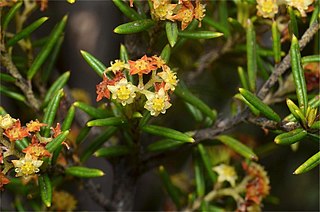
Spyridium daltonii is a species of flowering plant in the family Rhamnaceae and is endemic to Victoria in Australia. It is a shrub with softly-hairy branchlets, linear to narrowly elliptic leaves, and small groups of hairy, yellowish flowers.
Spyridium fontis-woodii, commonly known as Woods Well spyridium, is a species of flowering plant in the family Rhamnaceae and is endemic to a small area of Coorong National Park in South Australia. It is a slender shrub with softly-hairy young stems, broadly egg-shaped to broadly heart-shaped leaves with the narrower end towards the base, and head of white to cream-coloured flowers.

Spyridium furculentum, commonly known as forked spyridium, is a species of flowering plant in the family Rhamnaceae and is endemic to a small area of Victoria in Australia. It is a shrub with softly-hairy young stems, Y-shaped leaves, and head of white to cream-coloured flowers.
Spyridium glaucum is a species of flowering plant in the family Rhamnaceae and is endemic to a restricted area of south-western Western Australia. It is an erect or spreading shrub with egg-shaped leaves, and clusters of 3 to 6 rusty-hairy flowers.
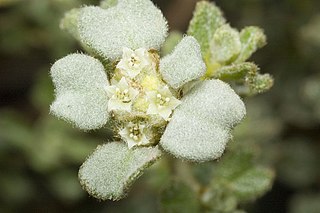
Spyridium halmaturinum, commonly known as Kangaroo Island spyridium, is a species of flowering plant in the family Rhamnaceae and is endemic to Kangaroo Island in South Australia. It is an erect, sticky shrub with densely softly-hairy young stems, leaves that are heart-shaped with the narrower end towards the base to broadly wedge-shaped or Y-shaped, and dense heads of white to cream-coloured flowers.
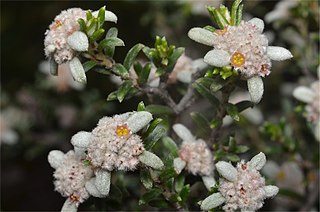
Spyridium leucopogon, commonly known as silvery spyridium, is a species of flowering plant in the family Rhamnaceae and is endemic to the Eyre Peninsula in South Australia. It is a small, slender shrub with narrowly linear leaves, and heads of woolly, white flowers.
Spyridium minutum is a species of flowering plant in the family Rhamnaceae and is endemic to the south of Western Australia. It is an erect or spreading shrub with broadly egg-shaped or heart-shaped leaves, and groups of two or three hairy, white flowers.
Spyridium montanum is a species of flowering plant in the family Rhamnaceae and is endemic to the Stirling Range in the south of Western Australia. It is an erect shrub with elliptic or egg-shaped leaves, and groups of up to ten densely hairy, white or cream-coloured flowers.
Spyridium mucronatum is a species of flowering plant in the family Rhamnaceae and is endemic to the south of Western Australia. It is an erect or spreading shrub usually with narrowly oblong leaves, and dense clusters of up to ten densely hairy, white to yellow flowers.
Spyridium × ramosissimum, commonly known as branched spyridium, is a species of flowering plant in the family Rhamnaceae and is endemic to Victoria in Australia. It is a small shrub with woolly-hairy branches, egg-shaped leaves, and crowded heads of hairy flowers with brown bracts.
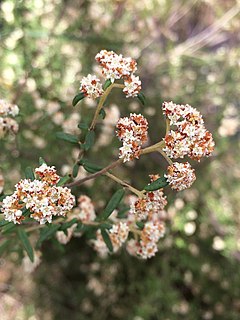
Spyridium riparium is a species of flowering plant in the family Rhamnaceae and is endemic to the south of Western Australia. It is an erect shrub, usually with narrowly egg-shaped leaves, and clusters of densely hairy, white or cream-coloured flowers.
Spyridium scabridum is a species of flowering plant in the family Rhamnaceae and is endemic to Kangaroo Island in South Australia. It is a slender, erect shrub or small tree with oblong or narrowly egg-shaped leaves, and heads of sparsely hairy, white to cream-coloured flowers surrounded by densely hairy floral leaves.

Spyridium spadiceum is a species of flowering plant in the family Rhamnaceae and is endemic to the south of Western Australia. It is an erect or semi-prostrate shrub with narrowly oblong to oval leaves and heads of hairy flowers with brown bracts at the base.
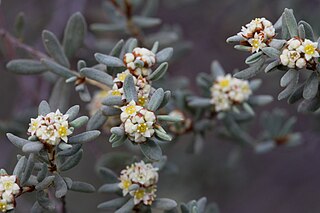
Spyridium subochreatum is a species of flowering plant in the family Rhamnaceae and is endemic to southern continental Australia. It is a low shrub with linear to oblong or narrowly egg-shaped leaves, and dense clusters of creamy-white flowers with dark brown, papery bracts at the base.












